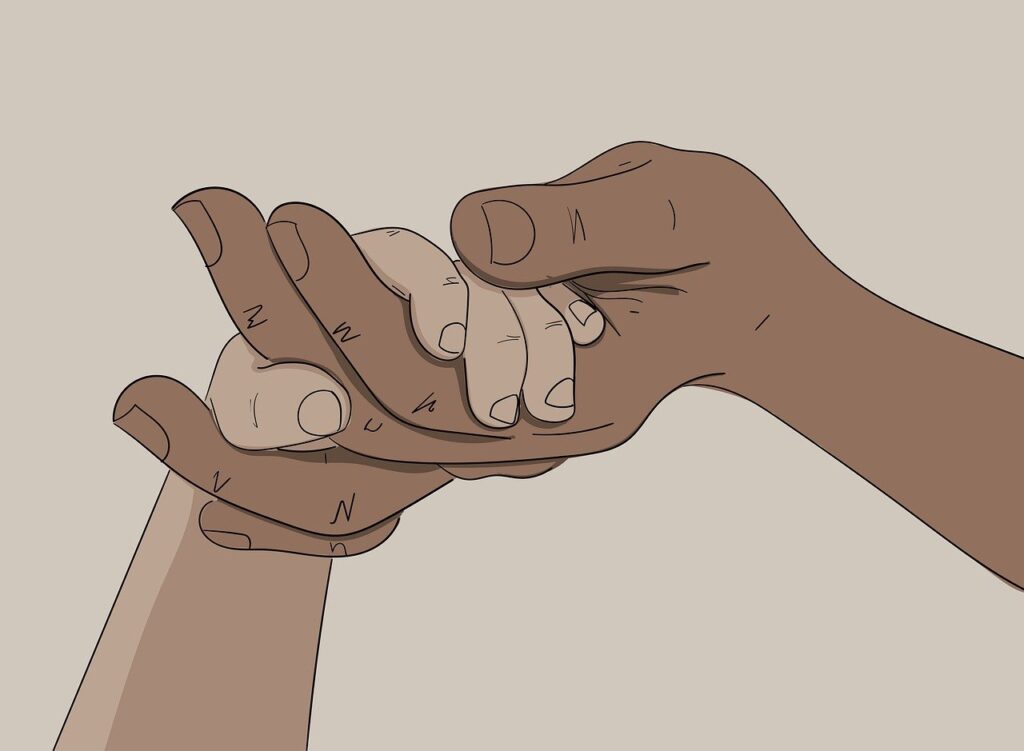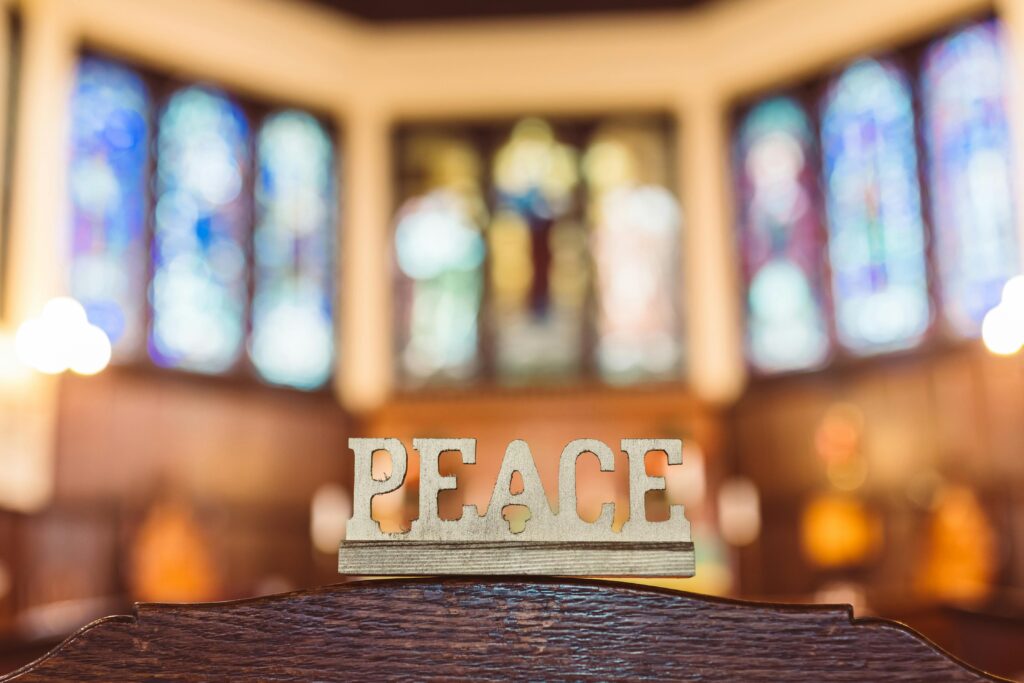I’ve been thinking a lot about peace lately.
Honestly, I struggle with the whole idea.
And I know I’m not alone. Splashed across the headlines, we read about wars in Ukraine and Russia, Israel, Palestine, and Iran, which are all front-page news.
In our local communities, violence and murder, economic depression, political corruption, and numerous abuses of power and position dominate our newsfeeds.
So we turn to God in prayer, as we should.
But the violence doesn’t stop. It doesn’t seem to make any difference. Does this mean that our prayers are ineffective? Is it God who’s just not listening?
Are things ever going to get better?
This is a Difficult Subject to Write About
I’m normally a slow writer (and thinker, if I’m being honest), but this article has been particularly difficult for me.
War and peace. Wrong and right. It sounds so simple, so cut and dry.
But through the writing process, I’ve come to some surprising conclusions. I’ve had to face some hard truths about myself and the world.
I realized exactly why I’ve been struggling with this topic so much in the first place.
Let me explain.
This morning, in praying the daily office, which we do at our church most days, I gained an insight into the problem.
It was in the selection of Psalm 119:53, which says:
I am filled with a burning rage,
Because of the wicked who forsake your law.
In this, I recognized myself. Eureka! It was so obvious.
The reason that I was having such a hard time writing about peace- and more specifically, the only true peace that ever was, is, and will be forever, amen- is because my heart is full of hate.
In other words, my heart is full of rage at the people who are making war.
Although, who am I kidding? If I’m honest, I have to admit that my heart is filled with anger and its companions: criticism, contempt, and judgment, toward anybody who is ever doing anything wrong.
This could be anger at something serious, like killing, at the waitress getting my order wrong at a restaurant when I’m really hungry, and anything in between.
I can go from perfectly peaceful to DEFCON 1 in record time, and seemingly over nothing.
Why is that, I wondered?
And I realized the answer was that my heart was not, as I had assumed, perfectly peaceful in the first place.
It’s actually full of anger and indifference, which is the root of all violence.
In other words, it’s full of sin.
Peace is not, as I had assumed, the absence of conflict, or the feeling that we get when everything around us is calm, serene, and beautiful.
God’s peace is something else, it is being “in line” or obedient to God’s commandments.
In other words, first and foremost, it’s not warring with God through sin.
Therefore, when Jesus says,
“Peace I leave with you; my peace I give to you. I do not give to you as the world gives. Do not let your hearts be troubled, and do not let them be afraid,” (John 14:27)
Jesus is not asking his followers to avoid conflict, or to avoid others in the world, but to avoid fighting with God in their hearts – by choosing God’s ways over their own.
But, you may ask, isn’t it good to be angry at people when they’re doing something wrong? Isn’t that the only way to make sure that those mistakes don’t happen again?
To answer these most important questions, I turn to the only answer- Holy Scripture- to see what God Himself has to say about the subject.

The Old Testament
One thing that may stand out in the Old Testament, is that God is angry at His people when they sin. There’s a lot of smiting going on.
For example, we recently had in the morning prayer lectionary, the reading from Exodus where the Israelites built an idol of a golden calf, instead of trusting in the Lord. When Moses came down from the mountain and saw what the people had done, God instructed him to do this:
When Moses saw that the people were running wild (for Aaron had let them run wild, to the derision of their enemies), then Moses stood in the gate of the camp, and said, ‘Who is on the Lord’s side? Come to me!’ And all the sons of Levi gathered around him. He said to them, ‘Thus says the Lord, the God of Israel, “Put your sword on your side, each of you! Go back and forth from gate to gate throughout the camp, and each of you kill your brother, your friend, and your neighbor.”’
Exodus 32:25-27
This is what, on the one hand, we sometimes think of when it comes to God. Complete and severe punishment for wrongdoing. Absolute, righteous vengeance.
And, if we’re honest, isn’t this what we desire for wrongdoers also?
Don’t we really want God to smite them?
This is what can get confusing about the Old Testament, which also means, the Old Covenant. It’s the covenant without the sacrificial offering of our Savior Jesus Christ, who died for all our sins.
Since the “penalty for sin is death”- in the Old Covenant, suffering and death are always the “fruits” of sin.
In our new covenant with God, Jesus suffered the penalty for our sins for us. He took the repercussions from us so that we can have forgiveness for them, instead of penalty or, punishment.
So back to war and waitresses…
God’s law is absolute- it is black and white, good is good, and sin is sin, and “There is no heaven with a little hell in it…” as George MacDonald said.
God’s boundaries against sin are clear and firm.
However, we, as imperfect human beings, take this severity against sin, and use it as a weapon against people.
We want to hate the waitress who messes up our meal, or the soldier who engages in war- instead of hating the sin that afflicts them.
God, on the other hand, offers us His generous forgiveness when we sin.
He gives us patient instruction and gentle guidance away from sin, while still hating the sin that burdens His beloved sinner. See the parable of the Prodigal Son and others in Luke 15, to see exactly what God’s kindness towards sinners looks like here.

Where God is generous and gracious, we tend to be critical, and contemptuous.
And I’m speaking first and foremost about myself.
I am naturally inclined to anger and to hate people who are doing something wrong- whatever the kind or severity of the offense.
But what I want is to have compassion for them in their sin, like God has given to me.
Therefore, when I see people doing something terrible, like making war on their neighboring country, it’s ok, right even, to recognize that they are choosing to do something wrong.
But what I shouldn’t do, is to make war in my heart against those making war on others.
The war in my heart against my neighbor may not be as physically traumatic as the war on the “ground”, but it is spiritually devastating to my soul nonetheless.
And because I’m putting myself on a different “side” than my brothers and sisters for any reason, I fail to see the true reality of the situation. That is, if I am truly on God’s side, the only enemy I have is sin. Sin alone, and never my neighbor who sins.
The Truth is that my neighbor and I are always completely and equally loved by God, no matter how or why we are sinning. And God always desires to meet sin with forgiveness, mercy, compassion, and understanding. Gently and lovingly guiding sinners away from sin and towards Him.
And He asks us all to love each other just the same.
Jesus tells us:
‘You have heard that it was said to those of ancient times, “You shall not murder”; and “whoever murders shall be liable to judgement.” But I say to you that if you are angry with a brother or sister, you will be liable to judgement; and if you insult a brother or sister, you will be liable to the council; and if you say, “You fool”, you will be liable to the hell of fire.
Matthew 5:21-22
So what does that mean for us?
Try as we might, sometimes we can’t change our natural feelings.
Sometimes, we just feel what we feel.
But guess what?
We can change other things, namely what we say and do.
We can change our words to and about others.
Instead of using our words to hurt or to wound, we can use our tongue to speak words of peace, and not hate.
The Psalmist pierces the true heart of the issue:
You plot ruin;
Your tongue is like a sharpened razor,
O worker of deception.
You love evil more than good
and lying more than speaking the truth.
You love all words that hurt,
O you deceitful tongue.
Psalm 52:2-4
And we can have faith that while we can’t change our feelings, God can.
God wants to restore everything that has been put out of whack by sin, to His good, perfect order.

He invites us to live according to His loving ways where everything and everyone is ordered around, because of, and through, His Divine goodness and love.
He wants to restore each of us to good order also, so that everything we think, feel, say, and do bears the good fruit of His goodness.
How can He do this?
God can and will do all good things for those who ask.
To begin with, we can ask Him in prayer.
Ask in faith, that He will give us feelings that will lead us to good, and not to evil.
And to know which feelings are good, we can read Holy Scripture every day.
His Word is the good food that will nourish us daily for goodness.
In fact, we won’t know what His goodness is if we don’t read it. Unlike reading a novel, or a history book, God’s Word is alive and active as we read it. It “reads us” back, and works to form us in His goodness.
It shows us how and when we are participating in sin so that we can repent, and ask for forgiveness for those sins.
Through this process of repenting, we can avoid sin in the future, because God gives us His good grace to love goodness and not sin.
Also, we can participate in the worship of God in our communion of the faithful as He asks us to do.
And finally, if we are being formed in God’s true peace, we will offer our patience and graciousness to others when their sins negatively affect us.
If we have God’s peace, we will act in peace.
As in most things, Paul says it best with this most wise admonition to the faithful:
So if you have been raised with Christ, seek the things that are above, where Christ is, seated at the right hand of God. Set your minds on things that are above, not on things that are on earth, for you have died, and your life is hidden with Christ in God. When Christ who is your life is revealed, then you also will be revealed with him in glory.
Put to death, therefore, whatever in you is earthly: fornication, impurity, passion, evil desire, and greed (which is idolatry). On account of these the wrath of God is coming on those who are disobedient. These are the ways you also once followed, when you were living that life. But now you must get rid of all such things—anger, wrath, malice, slander, and abusive language from your mouth. Do not lie to one another, seeing that you have stripped off the old self with its practices and have clothed yourselves with the new self, which is being renewed in knowledge according to the image of its creator.
And he continues:
As God’s chosen ones, holy and beloved, clothe yourselves with compassion, kindness, humility, meekness, and patience. Bear with one another and, if anyone has a complaint against another, forgive each other; just as the Lord has forgiven you, so you also must forgive. Above all, clothe yourselves with love, which binds everything together in perfect harmony. And let the peace of Christ rule in your hearts, to which indeed you were called in the one body.
Colossians 3:5-10,12-15
Being at peace isn’t ignoring or putting up boundaries to protect or separate us from situations or people in this violent and tumultuous world.
It isn’t merely a feeling, or the absence or avoidance of trouble and strife, but it is creating a boundary of grace in our hearts against sin, so that we can refuse to participate in sin of any kind.
So, what’s the problem?
It is the war in our hearts that is the problem.
Our war against God and His goodness, and our rage against our fellow sinners whom God has instructed us to love, not to hate, nor to punish when they do something wrong.
For John tells us:
Those who say, ‘I love God’, and hate their brothers or sisters, are liars; for those who do not love a brother or sister whom they have seen, cannot love God whom they have not seen. The commandment we have from him is this: those who love God must love their brothers and sisters also.
1 John 4:20-21
If we go on in life with our hearts full of anger, criticism, disdain, and complaint toward our brothers and sisters, these seeds will always grow and bear “bad fruit” if the conditions are right- and they often are.
They can even easily grow into violence.
I sometimes wonder, would I kill someone if they were trying to kill me?
Would I hurt someone to protect my property?
I’m tempted to wonder: isn’t that what’s coming to them if someone decides to commit a crime? Why shouldn’t they accept the consequences of their decisions?
You reap what you sow, right?
But Jesus showed us something different.
He reaps what we sow.

Jesus lives out God’s radical peace, suffering and dying for us, so that we needn’t suffer the consequences of our sinful actions.
So, thanks to Jesus and His atonement for us on the cross, the consequences of our sins – which should be suffering and death – are instead: forgiveness, mercy, understanding, compassion, help in trouble, and gentle guidance to a better way.
Because God loves us and sent His Son to save us, all of our violent acts of rage, destruction, and war are met with the healing balm of His generous forgiveness.
And this forgiveness is available to all who want it.
And all who want it will necessarily repent of their sinful, violent ways.
My Work to Do
All of this means that it’s unfruitful for me to pray for peace in the Middle East, when my heart is full of rage and war for my neighbor right next to me, right here.
The problem isn’t ever just over there, but also right here, in my heart.
And my work isn’t to look at them and shake my head at all the things they are doing wrong, but to let God change my heart from loving my naturally-occurring sinful feelings, to preferring His loving goodness.
If we are Jesus’ followers, we will continue His good work of love and peace with everything that we have- our time, energy, goods, prayers, and feelings.
And even giving up, as He did, our lives.
As John writes in his first letter:
We know love by this, that he laid down his life for us—and we ought to lay down our lives for one another. How does God’s love abide in anyone who has the world’s goods and sees a brother or sister in need and yet refuses help?
Little children, let us love, not in word or speech, but in truth and action. And by this we will know that we are from the truth and will reassure our hearts before him whenever our hearts condemn us; for God is greater than our hearts, and he knows everything. Beloved, if our hearts do not condemn us, we have boldness before God; and we receive from him whatever we ask, because we obey his commandments and do what pleases him.
And this is his commandment, that we should believe in the name of his Son Jesus Christ and love one another, just as he has commanded us. All who obey his commandments abide in him, and he abides in them. And by this we know that he abides in us, by the Spirit that he has given us.
1 John 3:16-24

I personally can’t make people stop bombing each other in Russia or Israel, but I can ask God to remove that sin of hate from my own heart.
So, if I ever had the opportunity to meet any of those who are at war, I won’t be like them- using violence against them to get what I want.
But instead, if what I really want is to be like Christ, I can pass on the love of God that He has so generously given to me- even in the midst of my sin- to other sinners.
And I can share that offer of what God is offering to all of us: love, peace, goodness, perfection, happiness, safety, and abundance.
I won’t be tempted to give them more of what they know so well already- hate, anger, contempt, criticism, punishment, and fear- because God will have plucked those most unfruitful seeds out of my own heart,
Leaving only His good seeds of love and truth,
To grow into the good fruit of His loving kingdom.
As the prayer attributed to St. Francis instructs us:
Lord, make us instruments of your peace. Where there is
hatred, let us sow love; where there is injury, pardon; where
there is discord, union; where there is doubt, faith; where
there is despair, hope; where there is darkness, light; where
there is sadness, joy. Grant that we may not so much seek to
be consoled as to console; to be understood as to understand;
to be loved as to love. For it is in giving that we receive; it is
in pardoning that we are pardoned; and it is in dying that we
are born to eternal life. Amen.
As we say in the Episcopal church, “Go in peace to love and serve the Lord.”
Thanks be to God.

